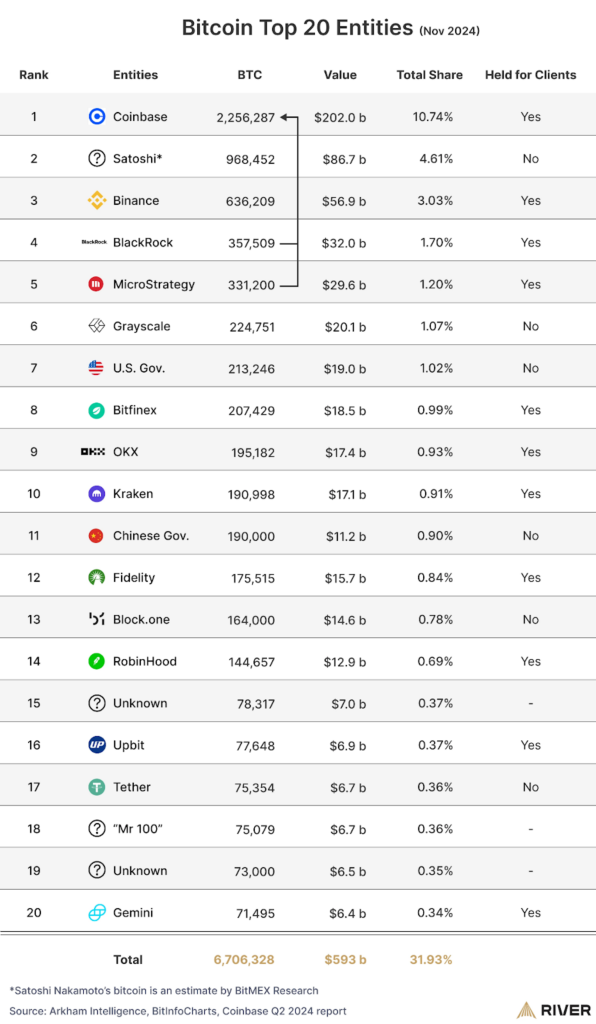The hottest debate that will hit the cryptocurrency market in the coming months of 2025 is simple. Who are going to be the largest bitcoin holders in 2025? Owning Bitcoin has anyways always strived to be a hot topic in the world of tech & finance.
From mysterious Satoshi Nakamoto to governments and corporate giants, Bitcoin distribution truly mirrors its universal appeal and widespread adoption. From that perspective, 2025’s largest Bitcoin holders lends us insights into market trends and dynamics underpinning this digital asset.
Satoshi Nakamoto: The Largest Bitcoin Holder

This might be the most ironic or humorous bit of the question because the largest owner of Bitcoin is its founder. Yes, you heard that right. Satoshi Nakamoto, a pseudonym for the Bitcoin owner, is currently the largest Bitcoin holder. A bit arbitrary, isn’t it?
Depending on whose estimates one takes, the Nakamoto Holdings are something in the order of 1,100,000 BTC, scattered across almost 20,000 different addresses. As of December 2024, that totals a staggering $94 billion, accounting for about 5.2% of Bitcoin’s capped supply. This massive hoard testifies to Nakamoto’s core role in the history of Bitcoin and its ongoing charm.
Despite such a towering fortune, Nakamoto’s coins have never been spent, fueling speculation over their motives and identity. There are a lot of theories surrounding Nakamoto’s identity: he may either be just one person or a group of developers, but nobody has proven anything.
It was in a sense, fitting that Satoshi had chosen to stay anonymous, and in 2010, he cut off communication. His final message was a technical one posted on a developer forum and wasn’t a goodbye message at all. That silence, added to the inactivity of his Bitcoin holdings, would give rise to theories on his purpose.
Some of them believe Nakamoto has proved a philosophical commitment to decentralization, making sure that no single entity could have undue influence over the trajectory of Bitcoin. Others had speculated that the coins were locked up because of lost keys—an all-too-common misfortune reflected in so many Bitcoin users losing access to their wallets.
This enigmatic figure’s holdings continue to have a profound psychological impact on the cryptocurrency market. These coins are dead in the water, therefore, affecting liquidity and price volatility, allowing the ecosystem to stabilize and mature. Yet, the potential for their eventual movement sets off frenzied debates and anxiety in the Bitcoin community. In many ways, the holdings of Satoshi Nakamoto do not measure wealth but rather the philosophical and economic underpinnings Bitcoin was based on: decentralization, scarcity, and weathering the storm of uncertainty.
Also Read: When Is the Best Time To Post on TikTok in 2025?
Corporate Titans: MicroStrategy Leads the Pack

Corporate interest in Bitcoin has grown massively in the recent past as companies wield the digital currency as a strategic asset. Leading the pack on the list of biggest corporate holders is one helmed by Michael Saylor: MicroStrategy, with a total of 152,333 BTC—roughly approximately 0.72% of the total supply of Bitcoin. Saylor’s strategy is quite aggressive; he borrows capital to raise debt and buy Bitcoin in hopes that the value will appreciate at a rate faster than that of rising inflation and devaluation in fiat currencies.
Also Read: Top Fitness & Health Hashtags To Grow Your Instagram
Other Big Corporate Names In Bitcoin Holdings
Robinhood Markets: A Key Player in Cryptocurrency Trading
With its trading platform holding a sizeable 122,765 BTC, Robinhood Markets has turned itself into a significant entity within the cryptocurrency space. It points toward a large reserve, signaling how the platform enables retail and institutional investors to be able to hold BTC and other digital assets in their portfolios.
With that being said, with simplified trading in cryptos, offering zero-commission trades, Robinhood has grown a vast user base spanning a number of clients around the globe and cementing its position in furthering democracy in access to financial services.
Marathon Digital Holdings: A Leading Bitcoin Mining Powerhouse
Marathon Digital Holdings is probably among the names in Bitcoin mining that have contributed the most to the cryptocurrency ecosystem. Currently, it holds 12,964 BTC in its treasury. It is a strong miner with strategic investments in its operations.
With state-of-the-art technology and sustainable mining practices, Marathon Digital has established itself as a clear leader within the global Bitcoin network. Its efforts have highlighted the growing importance of industrial-scale mining in securing the blockchain and ensuring the continuity of decentralized networks.
Tesla, Inc.: Revolutionizing Treasury Strategy with Bitcoin Investments
Under Elon Musk’s active leadership, Tesla has been in the news for its progressive move toward corporate finance. The company holds 10,725 BTC, which reflects a leading-edge treasury strategy and showcases its belief in cryptocurrency as an inflation hedge to deal with economic uncertainty.
Tesla’s Bitcoin holdings are rather a defining moment in the crypto market. It shows a broader adoption of these digital assets – one where it is now a globally recognized brand with real value in its storage. We understand that from a faraway perspective, the crypto market typically looks volatile, yet Tesla’s move does mean that the firm is quite serious in its message of embracing new technologies, including those in financial instruments.
Hut 8 Mining Corp
A Canadian Bitcoin Mining Powerhouse Hut 8 Mining Corp. ranks among the larger cryptocurrency mining companies in Canada, with a strong presence of over 9,000 BTC held. It has channeled its energy-efficient mining practices into running large-scale facilities in North America. Hut 8’s approach focuses on using renewable sources of energy coupled with state-of-the-art hardware to increase mining efficiency—something that has grown to give the company a substantial share of the Bitcoin ecosystem. With that, the company strengthens its leadership in sustainable cryptocurrency mining and evidences the increasing demand for eco-friendly practices within the digital asset space.
Taken together, public companies now hold more than 330,000 BTC—clear testimony to the rise in confidence in Bitcoin as a store of value and hedge against economic instability.
Also Read: 500+ Creative Aesthetic Usernames [for Social Media] 2025
Bitcoin Billionaires: The Individual Titans of Cryptocurrency
The rise of Bitcoin has created a new class of billionaires, including:
Tyler and Cameron Winklevoss
Twin entrepreneurs known for early investments, hold approximately 70,000 BTC. They have been the most high-profile and vocal advocates for the potential of Bitcoin as digital gold.
Tim Draper
This prominent venture capitalist purchased 29,656 BTC through a US government auction in 2014. An early investment has turned him into one of the wealthiest Bitcoin bulls alive.
Michael Saylor
On top of the MicroStrategy holdings, Saylor personally owns 17,732 BTC. His pro-Bitcoin attitude has turned him into one of the most powerful voices for it.
These individuals are sometimes referred to as “Bitcoin whales, ” and they have tremendous control over market sentiment and trends.
Bitcoin Wealth Distribution: A Concentrated Market
Ownership in Bitcoin is very concentrated, with four addresses owning between 100,000 and 1 million BTC holding a total of 704,497 BTC. Further, the 93 addresses in the range of 10,000 to 100,000 BTC hold 2,287,472 BTC. These addresses are generally institutional wallets and exchange reserves, worth about 14% of supply.
Interestingly, about 12% of the supply of Bitcoin is held by exchanges on behalf of clients. This custodial arrangement tracks the greater mainstream adoption of Bitcoin by retail investors through user-friendly platforms such as Coinbase, Binance, and Kraken.
Also Read: WAGMI Meaning Explained: The Acronym for Crypto Optimists
Governments in the Bitcoin Market
Government ownership of Bitcoin is a less-known but very important constituent of the market. The governments of various countries hold approximately 307,000 BTC, which constitutes about 1.5% of the total supply.
- United States: The U.S. government has confiscated large sums of Bitcoin via law enforcement activities, for instance, in the Silk Road case.
- China: Having cracked down on cryptocurrency trading, the country still holds 194,000 BTC seized from various enforcement operations.
- El Salvador: With a total of 2,381 BTC, El Salvador is the world’s first country to adopt Bitcoin as legal tender.
- Bhutan: The Kingdom of Bhutan surprisingly has 12,578 BTC, mostly mined.
These holdings reflect growing acceptance of the value of Bitcoin by national governments, be it as a reserve asset or as a strategic resource.
Institutional Investment: Indirect Bitcoin Exposure
Institutional investors have been increasingly seeking indirect exposure to Bitcoin through investment vehicles such as exchange-traded funds (ETFs) and trusts. The largest in this class is the iShares Bitcoin Trust by BlackRock, which has approximately 203,075 BTC under management. ETFs and similar products now hold 1,250,000 BTC, or 5.9% of the total supply.
All of this makes the role of Bitcoin in the changing asset class more appealing to traditional financial institutions and pension funds. These products mitigate risks for investors and foster wider adoption of Bitcoin through diversified portfolios.
Private Companies: A Growing Influence
Private firms also hold large amounts of Bitcoin. The biggest private holder is Block.one, a Chinese firm holding 164,000 BTC. Other heavy players include:
- Mt. Gox: The infamous exchange still holds 137,891 BTC in its bankruptcy process.
- Stone Ridge Holdings Group: A US-based company owning 10,889 BTC.
- Tether Holdings LTD: The stable coin USDT issuer holds 58,000 BTC valued at $8 billion.
These institutional holdings show that Bitcoin is attractive not just to fintech but a broad range of traditional financial industries.
Also Read: PFP Meaning: What Does PFP Stand For On Social Media?
Total Bitcoin Supply: A Finite Resource
Bitcoin’s total supply is capped at 21 million coins, making it a finite resource. But this theoretical cap excludes a few factors:
Satoshi’s Holdings: Nearly 1.1 million BTC are unlikely to enter circulation.
Lost Bitcoin: An estimated 1.6 million BTC are estimated to be irretrievably lost due to forgotten passwords and discarded hardware.
It brings the effective supply down to something like 18 million BTC, which further solidifies the scarcity of Bitcoin. Meaning that large holders’ ownership percentages do make sense in trying to define the market dynamics and long-term value proposition.
Conclusion: A Diverse Ownership Landscape
In 2025, the ownership landscape of Bitcoin reflects its universal appeal, from Satoshi Nakamoto’s untouched fortune to corporate treasuries, government reserves, and individual whales, the largest Bitcoin holders play pivotal roles in the cryptocurrency’s ecosystem. Institutional adoption and increasing governmental interest signal Bitcoin’s transition from a niche asset to a mainstream financial instrument.










